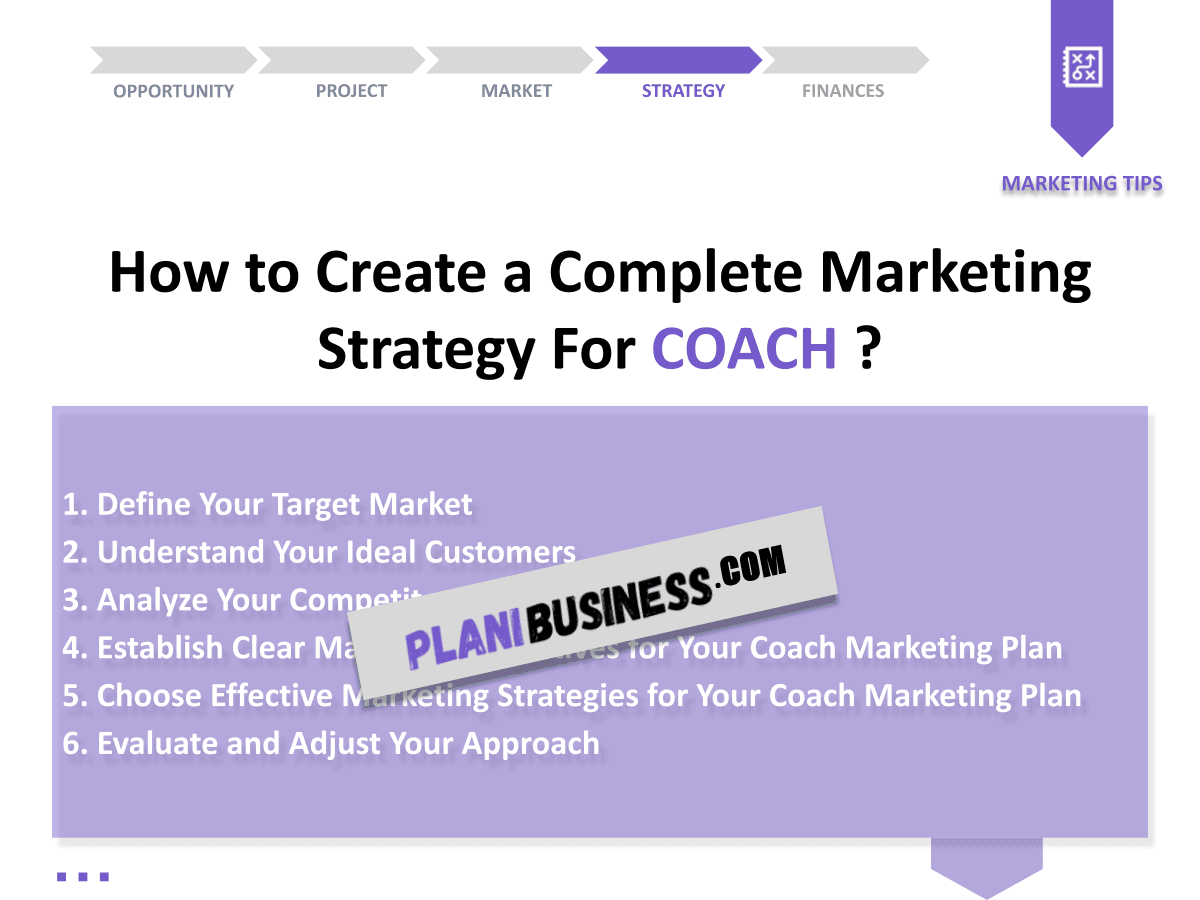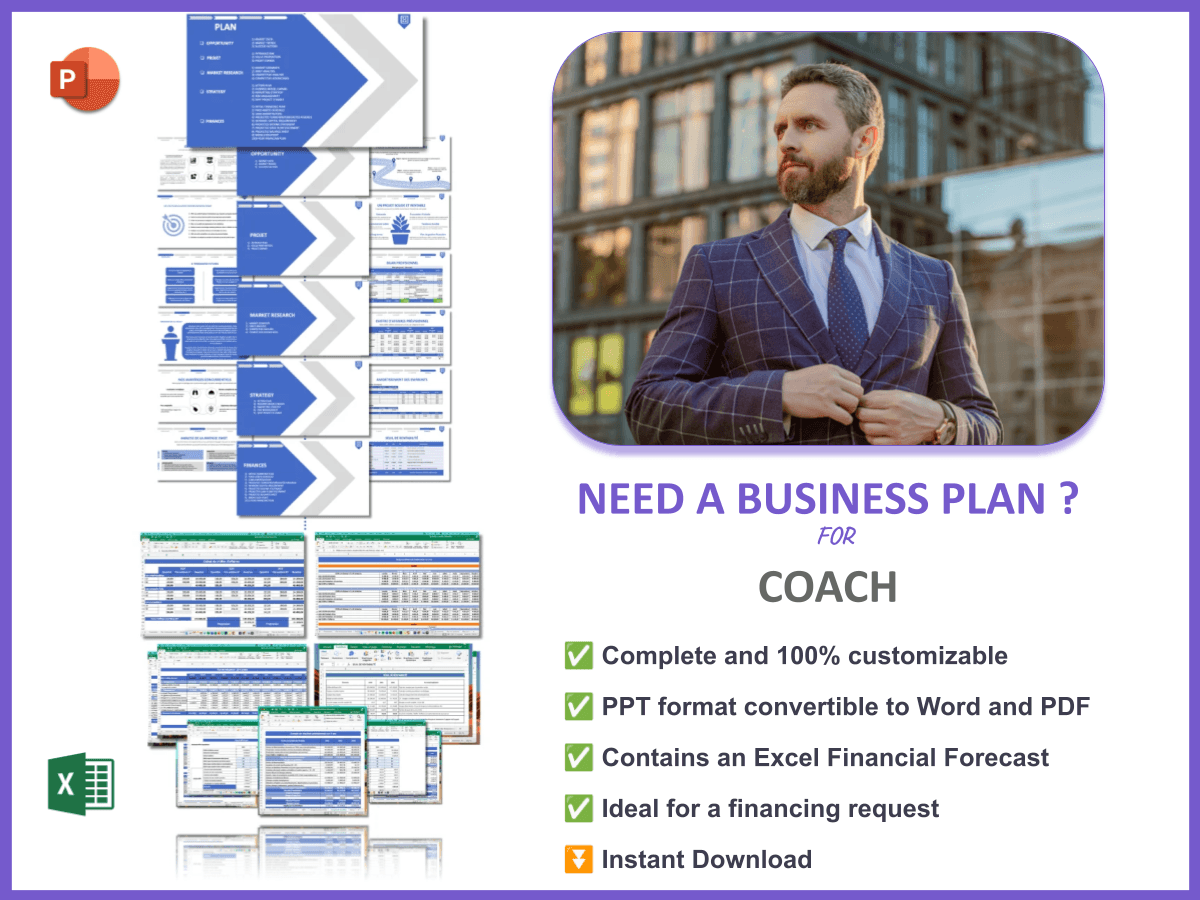Are you thinking about starting a coaching business? You’re not alone! The coaching industry has seen a tremendous growth of over 80% in recent years, and it’s no surprise that aspiring coaches are eager to carve their niche. A well-structured Coach Marketing Plan can be the key to standing out in this competitive field.
A Coach Marketing Plan is a strategic outline that helps you define your target audience, set marketing objectives, and implement effective strategies to attract clients. In this article, we will cover:
- Identifying your target market
- Understanding your ideal customers
- Analyzing your competitors
- Establishing clear marketing objectives
- Choosing effective marketing strategies
- Evaluating and adjusting your approach
1. Define Your Target Market
| Aspect | Details |
|---|---|
| Demographics | Age, Gender, Income Level |
| Psychographics | Interests, Values, Lifestyle |
Defining your target market is crucial for your Coach Marketing Plan. It involves understanding who your potential clients are and tailoring your marketing strategies to meet their specific needs. Knowing the demographics such as age, gender, and income level helps you create focused campaigns that speak directly to your audience.
Additionally, understanding psychographics—like interests, values, and lifestyle—enables you to connect with your audience on a deeper level. This insight allows you to craft messages that resonate, ultimately leading to higher engagement and conversion rates.
2. Understand Your Ideal Customers
| Characteristic | Description |
|---|---|
| Goals | What do they want to achieve? |
| Pain Points | What challenges do they face? |
Understanding your ideal customers is vital for the success of your Coach Marketing Plan. By identifying their goals, you can tailor your services to help them achieve what they want. For instance, if your ideal customer is a business professional seeking work-life balance, you could offer coaching sessions focused on time management and productivity.
Moreover, recognizing their pain points is equally important. What challenges are they facing? By addressing these issues in your marketing materials, you show empathy and expertise, making it more likely for potential clients to choose you as their coach. Your marketing should speak to their struggles and offer solutions that genuinely help them.
3. Analyze Your Competitors
| Competitor | Strengths | Weaknesses |
|---|---|---|
| Competitor A | Strong online presence | High pricing |
| Competitor B | Affordable services | Limited marketing |
Analyzing your competitors is a vital step in your Coach Marketing Plan. It helps you identify gaps in the market and understand what works and what doesn’t in your niche. By examining the strengths and weaknesses of your competitors, you can develop strategies that leverage their shortcomings while capitalizing on your unique offerings.
For instance, if you notice that a competitor has a strong online presence but charges high fees, you could position yourself as a more affordable alternative with personalized service. This approach not only attracts clients who may feel priced out but also allows you to stand out in a crowded market.
Furthermore, keep an eye on their marketing tactics. What platforms are they using? What type of content do they share? Understanding these elements can help you refine your own strategies and ensure that you are effectively reaching your target audience.
4. Establish Clear Marketing Objectives for Your Coach Marketing Plan
| Objective | Metric |
|---|---|
| Increase Website Traffic | By 30% in 6 months |
| Grow Social Media Following | By 50% in 3 months |
Setting clear marketing objectives provides direction for your Coach Marketing Plan. These objectives should be specific, measurable, achievable, relevant, and time-bound (SMART). For example, if one of your objectives is to increase website traffic, you might aim for a 30% increase in the next 6 months.
Another objective could be to grow your social media following by 50% within 3 months. Having these clear metrics in place not only gives you a target to aim for but also allows you to evaluate your progress over time.
Moreover, these objectives should align with your overall business goals. If your aim is to become a recognized expert in your field, consider objectives that enhance your visibility and authority, such as increasing guest blog posts or speaking engagements.
5. Choose Effective Marketing Strategies for Your Coach Marketing Plan
| Strategy | Description |
|---|---|
| Content Marketing | Create valuable content to attract clients |
| Social Media Marketing | Engage with your audience on platforms like Instagram and Facebook |
Choosing the right marketing strategies is essential for reaching your goals in your Coach Marketing Plan. One effective approach is content marketing, which involves creating valuable content that addresses your audience’s needs and interests. This could include blog posts, videos, or podcasts that showcase your expertise and provide solutions to common challenges faced by your target market.
Another powerful strategy is social media marketing. Engaging with your audience on platforms like Instagram and Facebook allows you to build a community around your brand. Share tips, client success stories, and behind-the-scenes glimpses of your coaching process to foster connection and trust. Remember, consistency is key—regularly post engaging content to keep your audience interested.
Additionally, consider incorporating email marketing into your strategy. Sending out newsletters with valuable insights and updates can help keep your audience engaged and informed about your services. Offering a free resource, such as an ebook or a mini-course, in exchange for email sign-ups can also grow your list significantly.
6. Evaluate and Adjust Your Approach
| Metric | Action |
|---|---|
| Client Acquisition Cost | Reduce by 20% |
| Client Retention Rate | Increase by 15% |
Regularly evaluating your strategies ensures you stay on track with your Coach Marketing Plan. It’s important to monitor key metrics such as client acquisition cost and client retention rate. For instance, if your goal is to reduce your client acquisition cost by 20%, track your marketing expenses and the number of new clients gained to assess your effectiveness.
Similarly, improving your client retention rate is crucial for long-term success. Aim for an increase of 15% by implementing follow-up strategies, such as sending personalized check-ins or offering loyalty discounts for returning clients. This not only helps you maintain your client base but also encourages referrals.
As you evaluate your marketing efforts, be open to adjusting your approach based on the data you collect. If certain strategies aren’t yielding the desired results, don’t hesitate to pivot and try new tactics. Flexibility and responsiveness to your audience’s needs will ultimately enhance the effectiveness of your Coach Marketing Plan.
7. Example N°1 of marketing plan for a Health Coach
| Steps | Actions | Details |
|---|---|---|
| Target Market | Health-conscious individuals | Focus on millennials interested in fitness |
| Ideal Customers | Busy professionals | Offer time-efficient coaching sessions |
| Competitors | Analyze local health coaches | Identify their strengths and weaknesses |
| Marketing Objectives | Increase client base by 25% | In 6 months |
| Marketing Strategies | Use social media ads | Target health-conscious demographics |
| Evaluation | Track conversion rates | Adjust campaigns based on performance |
This example of a Coach Marketing Plan for a health coach outlines a clear path to success. The target market is defined as health-conscious individuals, particularly millennials who are interested in fitness. By focusing on busy professionals, the health coach can offer tailored coaching sessions that fit into their hectic lifestyles.
To differentiate from competitors, it’s essential to analyze local health coaches, identifying their strengths and weaknesses. This knowledge helps in crafting unique selling propositions that can attract potential clients. The marketing objective of increasing the client base by 25% in 6 months provides a measurable goal to strive for.
Implementing marketing strategies such as targeted social media ads can effectively reach the desired demographics. Finally, tracking conversion rates allows the coach to evaluate the effectiveness of the campaigns and make necessary adjustments to optimize results.
8. Example N°2 of marketing plan for a Life Coach
| Steps | Actions | Details |
|---|---|---|
| Target Market | Individuals seeking personal growth | Focus on young adults |
| Ideal Customers | People in transition | Offer tailored coaching packages |
| Competitors | Research other life coaches | Analyze their pricing and services |
| Marketing Objectives | Boost online presence by 40% | In 4 months |
| Marketing Strategies | Leverage email marketing | Build a newsletter |
| Evaluation | Review subscriber growth | Adjust content strategy accordingly |
This Coach Marketing Plan example for a life coach focuses on individuals seeking personal growth, particularly young adults in transitional phases of their lives. By offering tailored coaching packages, the life coach can address the specific needs of their ideal customers.
Researching other life coaches helps in understanding the competitive landscape, allowing the life coach to differentiate their services effectively. The objective of boosting online presence by 40% within 4 months is both ambitious and measurable.
Implementing email marketing as a key strategy can help build a loyal following. By creating a newsletter that offers valuable insights and resources, the life coach can engage their audience and nurture potential clients. Evaluating subscriber growth will provide insights into the effectiveness of the content strategy, allowing for adjustments as necessary to enhance engagement.
9. Example N°3 of marketing plan for a Business Coach
| Steps | Actions | Details |
|---|---|---|
| Target Market | Small business owners | Focus on startups |
| Ideal Customers | Entrepreneurs looking to scale | Provide growth strategies |
| Competitors | Identify other business coaches | Evaluate their offerings |
| Marketing Objectives | Increase client engagement by 30% | In 5 months |
| Marketing Strategies | Host free webinars | Showcase your expertise |
| Evaluation | Analyze webinar attendance | Refine topics based on feedback |
This Coach Marketing Plan example for a business coach targets small business owners, particularly startups looking for growth strategies. By focusing on entrepreneurs who are eager to scale, the business coach can tailor their services to meet specific needs and challenges faced by this audience.
Identifying competitors in the coaching space is essential to understand the landscape. By evaluating their offerings, the business coach can find ways to differentiate themselves and offer unique value. The marketing objective of increasing client engagement by 30% in 5 months provides a clear goal to strive for.
To achieve this objective, hosting free webinars is an effective strategy. These webinars not only showcase the coach’s expertise but also provide valuable insights that can attract potential clients. Evaluating webinar attendance and gathering feedback will help refine future topics and improve overall engagement.
10. Example N°4 of marketing plan for a Career Coach
| Steps | Actions | Details |
|---|---|---|
| Target Market | Job seekers | Focus on recent graduates |
| Ideal Customers | Individuals changing careers | Offer career transition plans |
| Competitors | Research other career coaches | Analyze their methods |
| Marketing Objectives | Enhance visibility by 50% | In 3 months |
| Marketing Strategies | Engage on LinkedIn | Share valuable content |
| Evaluation | Track engagement metrics | Make adjustments based on results |
This Coach Marketing Plan for a career coach is tailored to job seekers, specifically recent graduates who are navigating the job market. By offering career transition plans, the coach can address the specific needs of individuals looking to make significant career changes.
Researching other career coaches helps identify effective methods and strategies in the field. This competitive analysis allows the career coach to find gaps in the market and position themselves as a go-to resource. The objective of enhancing visibility by 50% in 3 months is an ambitious yet attainable goal.
Engaging on LinkedIn is a key strategy for this coach. By sharing valuable content and insights related to career development, the coach can build a following and establish authority in their niche. Finally, tracking engagement metrics will provide insights into the effectiveness of their efforts, allowing for necessary adjustments to optimize results.
11. Example N°5 of marketing plan for a Relationship Coach
| Steps | Actions | Details |
|---|---|---|
| Target Market | Couples seeking improvement | Focus on married couples |
| Ideal Customers | Individuals facing relationship challenges | Provide tailored sessions |
| Competitors | Analyze local relationship coaches | Identify their strengths |
| Marketing Objectives | Grow client base by 20% | In 6 months |
| Marketing Strategies | Offer free consultations | Attract potential clients |
| Evaluation | Monitor conversion rates | Adjust strategy as necessary |
This Coach Marketing Plan example for a relationship coach focuses on couples seeking improvement, specifically married couples who may be facing challenges. By providing tailored sessions that address the unique needs of these clients, the relationship coach can foster deeper connections and promote healthier relationships.
To differentiate from competitors, it’s crucial to analyze local relationship coaches and identify their strengths. This knowledge helps in crafting unique value propositions that resonate with potential clients. The marketing objective of growing the client base by 20% in 6 months is a clear and achievable goal.
Offering free consultations is an effective strategy to attract potential clients. This not only showcases the coach’s expertise but also allows couples to experience the value of the sessions before committing. Monitoring conversion rates will provide insights into the effectiveness of this approach, allowing for necessary adjustments to optimize client acquisition.
12. Example N°6 of marketing plan for a Fitness Coach
| Steps | Actions | Details |
|---|---|---|
| Target Market | Health-conscious individuals | Focus on young adults |
| Ideal Customers | Individuals looking to lose weight | Offer personalized training plans |
| Competitors | Research other fitness coaches | Evaluate their service offerings |
| Marketing Objectives | Increase class enrollment by 40% | In 4 months |
| Marketing Strategies | Utilize Instagram for promotions | Showcase client success stories |
| Evaluation | Review client feedback | Make necessary adjustments |
This Coach Marketing Plan for a fitness coach targets health-conscious individuals, particularly young adults who are looking to lose weight. By offering personalized training plans that cater to individual needs, the fitness coach can effectively address the specific challenges faced by their clients.
Researching other fitness coaches is essential to understand the competitive landscape and identify successful strategies. The objective of increasing class enrollment by 40% in 4 months provides a measurable target to work towards.
Utilizing Instagram for promotions is a key strategy, as it allows the coach to showcase client success stories and engage with a broader audience. Reviewing client feedback will provide valuable insights into the effectiveness of the coaching methods, enabling the coach to make necessary adjustments to improve client satisfaction and retention.
13. Example N°7 of marketing plan for a Spiritual Coach
| Steps | Actions | Details |
|---|---|---|
| Target Market | Individuals seeking spiritual growth | Focus on those interested in mindfulness |
| Ideal Customers | People looking for inner peace | Offer meditation and coaching sessions |
| Competitors | Identify other spiritual coaches | Assess their approach |
| Marketing Objectives | Expand client reach by 30% | In 5 months |
| Marketing Strategies | Host workshops | Promote personal development |
| Evaluation | Track workshop attendance | Adjust future offerings based on feedback |
This Coach Marketing Plan example for a spiritual coach focuses on individuals seeking spiritual growth, particularly those interested in mindfulness and inner peace. By offering meditation and coaching sessions, the spiritual coach can provide valuable support to those looking to enhance their spiritual journey.
Identifying competitors in the spiritual coaching space is essential for understanding various approaches and finding ways to stand out. The marketing objective of expanding client reach by 30% in 5 months provides a clear target to achieve.
Hosting workshops is a key strategy for promoting personal development and attracting new clients. By providing valuable content in a group setting, the coach can build community and foster connections. Tracking workshop attendance and gathering feedback will help refine future offerings and ensure they meet the needs of clients effectively.
Conclusion
In summary, creating a comprehensive Coach Marketing Plan is essential for any coaching business looking to thrive in a competitive market. By defining your target market, understanding your ideal customers, analyzing competitors, and establishing clear marketing objectives, you can effectively position yourself for success. Remember to choose effective marketing strategies and continually evaluate your approach to ensure you are meeting your goals.
If you’re ready to take your coaching business to the next level, consider utilizing a well-structured business plan. Check out this business plan template for coaches to help streamline your planning process.
Additionally, you might find value in our other articles. Learn how to get started with your coaching journey in our article on How to Kickstart a Coaching Business?. Also, discover how to perform a SWOT analysis for coaches to identify your strengths and opportunities in the market.
FAQ
- What is a Coach Marketing Plan?A Coach Marketing Plan is a strategic outline that helps coaching professionals define their target audience, set marketing objectives, and implement effective strategies to attract clients.
- How do I define my target market as a coach?To define your target market, consider demographics such as age, gender, and income level, as well as psychographics like interests and lifestyle. This helps tailor your marketing efforts.
- What marketing strategies should I use as a coach?Effective marketing strategies for coaches include content marketing, social media marketing, and email marketing. These strategies help engage your audience and promote your services.
- How can I analyze my competitors?Research your competitors by examining their strengths, weaknesses, pricing, and marketing strategies. This analysis helps you identify gaps in the market and differentiate your offerings.
- What are some common marketing objectives for coaches?Common marketing objectives include increasing website traffic, growing social media following, enhancing client engagement, and boosting client retention rates.
- How often should I evaluate my marketing plan?Regular evaluation is key; ideally, you should assess your marketing plan at least every quarter. This allows you to make timely adjustments based on performance metrics.
- What is the importance of a SWOT analysis for coaches?A SWOT analysis helps coaches identify their strengths, weaknesses, opportunities, and threats in the market, enabling them to make informed decisions and strategies.
- How can I attract clients as a new coach?Attract clients by offering free consultations, hosting workshops, and leveraging social media to showcase your expertise and connect with your target audience.
- What role does social media play in a coach’s marketing plan?Social media is crucial for building your brand, engaging with potential clients, and sharing valuable content that showcases your coaching expertise.
- Can I use a business plan template for my coaching business?Yes! Using a business plan template can provide a structured approach to developing your coaching business strategy, making it easier to outline your goals and objectives.







